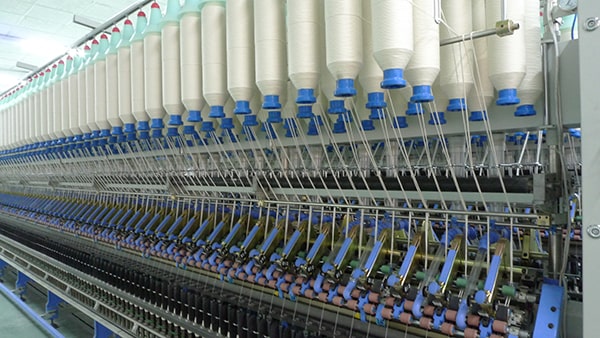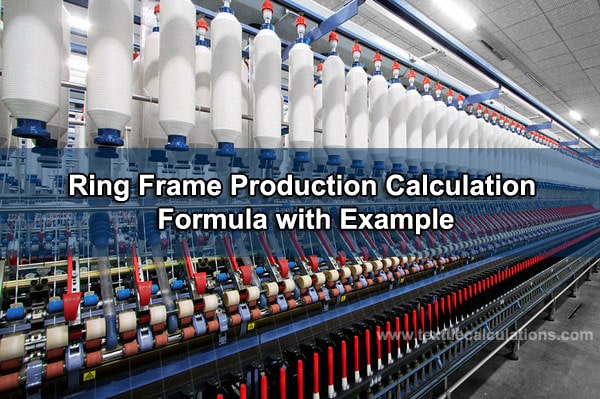Introduction
Ring Frame is the last and most important machine in a spinning mill where the final draft is applied on roving and converted to yarn with the required count, i.e., the final yarn with desired count gets spun on the Ring Frame machine. Actually, Ring spinning is a method of producing yarn from fibers like cotton, wool, flax etc. It is mostly used in yarn manufacturing. Usually three actions (Drafting, Twisting & Package Formation) are done in this process. So, calculations play an important role in Ring Frame. Some important calculation (Draft, Draft Constant, Twist Constant, TPI, TPM, Machine Production, Production Loss, Machine Efficiency, No of Spindle, No of Ring Frame, TCP, Yarn Count etc.) of Ring Frame machine are explained below.

Some Important Conversion Factors for Ring Frame Production Calculation:
- 36 inch = 3 Feet = 1 Yard;
- 1 Meter = 1.0936 Yards;
- 840 Yard = 7 Lea = 1 Hank;
- 1 Pound(lb) = 453.6 Gram = 16 Ounce (Oz);
- 1 Lea = 120 Yards;
- 1 Pound (lb) = 7000 Grains;
- 1 Meter = 39.37 Inch;
- 1 inch = 2.54 cm;
- 1 cm = 10 mm;
- 1 Kg = 2.205 Pound (lb)
***Yarn Count means the number of 840 yards length that weight exactly 1 pound (lb)
Ring Frame Production Calculation Formula with Examples
1. TPI = Tm x √ Count (Ne)
…………………………………..Spindle Speed x No of Spindle x Effi. x 60 x 8
2. Production per Shift = —————————————————————————-
………………………………………….TPI x Yarn Count x 36 x 840
Example: In a Ring Frame 40 Ne carded yarn is to be spun in which spindle speed is 16000 rpm and there are 504 working spindles. If the machine runs at 96% efficiency and twist multiplier is 4.2. Find out its production in lbs per shift.
Solution:
Here given,
Yarn Count = 40 Ne
Spindle Speed = 16000 rpm
No of Spindle = 504
Twist Multiplier, Tm = 4.2
Efficiency = 96% = 0.96
TPI = Tm x √ Count (Ne)
= 4.2 x √ 40
= 26.56
…………………………………….Spindle Speed x No of Spindle x Efficiency x 60 x 8
Production per Shift = ——————————————————————————–
……………………………………………………TPI x Yarn Count x 36 x 840
…16000 x 504 x 0.96 x 60 x 8
= ————————————————— lbs
……26.56 x 40 x 36 x 840
= 115.66 lbs (Ans)
3. Production Loss in Spindle-hr = No of Spindle x Time in Hour
………………………………………OPS x Spindle – hr
4. Production Loss in lbs = —————————————-
…………………………………………….16 x 8
Example: A Ring Frame was stopped for 30 minutes due to back creeling. Find out the production loss in lbs and spindle-hr for block creeling. Let OPS = 4 and No of Spindle = 504
Solution:
Here Given, Ounce per Spindle Production, OPS = 4
Stoppage Time = 30 mins = 0.5 hour
No of Spindle = 504
Production Loss in Spindle-hr = No of Spindle x Time in Hour
= 504 x 0.5
= 252 spindle-hr. (Ans)
………………………………………..OPS x Spindle – hr
Production Loss in lbs = ———————————–
……………………………………………..16 x 8
…4 x 252
= ————– = 7.875 lbs (Ans)
….16 x 8
………………………..Production (lbs/day) x TPI x Yarn Count x 36 x 840
5. No of Spindle = —————————————————————————————
…………………………………Spindle Speed x 60 x 24 x Efficiency
……………………………………Req. No of Spindle
6. No of Ring Frame = —————————————————
…………………………………Present No of Spindle
Example: If production requirement of 40 Ne cotton yarn is 2500 lbs/day. How many Ring Frames will be required to fulfill these requirements? Assuming necessary parameters.
Solution:
Here given,
Production per Day = 2500 lbs
Yarn Count = 40 Ne
Let, Spindle Speed = 15000 RPM
TPI = 28
Efficiency = 92% = 0.92
……………………….Production (lbs/day) x TPI x Yarn Count x 36 x 840
No of Spindle = —————————————————————————–
………………………………..Spindle Speed x 60 x 24 x Efficiency
…2500 x 28 x 40 x 36 x 840
= ———————————————————
…..15000 x 60 x 24 x 0.92
= 4260.87 ≈ 4261 Spindles required.
4261 Spindles will be required and if there are 504 Spindle/Ring Frame, then required-
……………………………..Required No of Spindles
No of Ring Frame = ——————————————
…………………………………..Present Spindles
…4261
= ————– = 8.45 ≈ 9
….504
So, 9 Ring Frames are needed. (Ans)
7. Required TCP x Required TPI = Existing TCP x Existing TPI
Example: Find out the required TCP to produce 40 Ne carded woven yarn when twist multiplier is 4.4, existing TCP is 48T and existing TPI is 22.6
Solution:
Here given,
Existing TCP = 48T
Existing TPI = 22.6
Yarn Count = 40 Ne
Twist Multiplier = 4.4
Required TPI = Tm x √ Count (Ne)
= 4.4 x√ 40 = 27.83
Required TCP x Required TPI = Existing TCP x Existing TPI
…………………………..Existing (TCP x TPI)
Required TCP = —————————————-
………………………………Required TPI
…48 x 22.6
= ——————– = 38.98 ≈ 39 T (Ans)
…..27.83
………………………………..Total Shift Time – Total Stoppage Time
8. Machine Efficiency = —————————————————————— x 100
……………………………………………….Total Shift Time
Example: Calculate the Ring Frame machine efficiency using the following parameters-
- Doffing Time = 12 mins
- Yarn Breakage Time = 13 mins
- Other Stoppage Time = 17 mins
Solution:
Here given,
Doffing Time = 12 mins
Yarn Breakage Time = 13 mins
Other Stoppage Time = 17 mins
Total Stoppage Time = 12 + 13 + 17 = 42 Mins
Let, Shift Time = 8 hrs = 480 Mins
……………………………………Total Shift Time – Total Stoppage Time
Machine Efficiency = ——————————————————————– x 100
………………………………………………….Total Shift Time
…480 – 42
= —————- x 100
……480
= 91.25% (Ans)
…………………………..Spindle Speed x No of Spindle x Effi. x 0.59 x 60 x 24
9. Production/Day = ————————————————————————————
…………………………………………….TPM x Count (Ne) x 1000
10. TPM = TPI x 39.37
11. Yarn Count = Roving Hank x Ring Draft
Example: Calculate the machine production per day using the following parameters-
- Spindle Speed = 18000 RPM
- Roving Hank =1.5
- Ring Draft = 25
- No of Spindles = 504
- Twist Multiplier = 3.8
- M/C Efficiency = 95%
Solution:
Here given,
Spindle Speed = 18000 RPM
No of Spindle = 504
Roving Hank =1.5
Ring Draft = 25
Twist Multiplier, Tm = 3.8
Efficiency = 95% = 0.95
We Know,
Yarn Count = Roving Hank x Ring Draft
= 1.5 x 25
= 37.5 ≈ 38 (Ne)
TPI = Tm x √ Count (Ne)
= 3.8 x √ 38
= 23.42
TPM = TPI x 39.37
= 23.42 x 39.37
= 922.05
……………………………Spindle Speed x No of Spindle x Efficiency x 0.59 x 60 x 24
Production/Day = —————————————————————————————-
……………………………………………………..TPM x Count (Ne) x 1000
…18000 x 504 x 0.95 x 0.59 x 60 x 24
= —————————————————– kgs
…………..922.05 x 38 x 1000
= 208.98 kgs (Ans)
…………………………Surface Speed of Front Roller
12. Main Draft = —————————————————————
……………………….Surface Speed of Middle Roller
………………………..Surface Speed of Middle Roller
13. Break Draft = —————————————————————
………………………….Surface Speed of Back Roller
14. Surface Speed of Roller = π x Roller Dia x Roller RPM
15. Total Draft = Main Draft x Break Draft
16. Draft Constant = Total Draft x DCW
…………………………………….Spindle Speed
17. Twist Constant = ————————————————- x TCP
…………………………….Delivery Speed (inch/min)
Example: Calculate the main draft, break draft, total draft, draft constant and twist constant using the following parameters-
- Front Roller dia = 27”
- Middle Roller Dia = 27”
- Back Roller Dia = 27”
- Front Roller Speed = 155 rpm
- Middle Roller Speed = 15 rpm
- Back Roller Speed = 10 rpm
- Draft Change Wheel = 70
- Spindle Speed = 13000 RPM
- Delivery Speed (inch/min) = 525
- TCP = 83
Solution:
Surface Speed of Front Roller = π x FR Dia x FR RPM
= 3.1416 x 27 x 155
= 13147.596 inch/min
Surface Speed of Middle Roller = π x MR Dia x MR rpm
= 3.1416 x 27 x 15
= 1272.348 inch/min
Surface Speed of Back Roller = π x BR Dia x BR RPM
= 3.1416 x 27 x 10
= 848.232 inch/min
……………………13147.596
Main Draft = ——————– = 10.33 (Ans)
…………………….1272.348
…………………….1272.348
Break Draft = ——————- = 1.5 (Ans)
…………………….848.232
Total Draft = Main Draft x Break Draft
= 10.33 x 1.5 = 15.5 (Ans)
Draft Constant = Total Draft x DCW
= 15.5 x 70 = 1085 (Ans)
……………………………………Spindle Speed
Twist Constant = ————————————————- x TCP
………………………….Delivery Speed (inch/min)
…13000
= ————— x 83
…..525
= 2055.24 (Ans)
Conclusion
I have tried to explain the production and other calculation formulas with examples of Ring Frame machine through this article. Hope this article will be helpful for those who are new to the spinning mill or those who are students.
Author of this Article:
Md. Imran Hossain
B.Sc. in Textile Engineering
Shahid Abdur Rab Serniabat Textile Engineering College, Barisal.
Email: [email protected]
You may also like:
- Blow Room Production Calculations Formula with Example
- Carding Machine Production Calculations Formula with Example
- Production Calculation of Draw Frame with Formulas & Examples
- Roving Frame/Simplex Machine Production Calculations with Examples
- Lap Former & Comber Machine Production Calculations with Example

